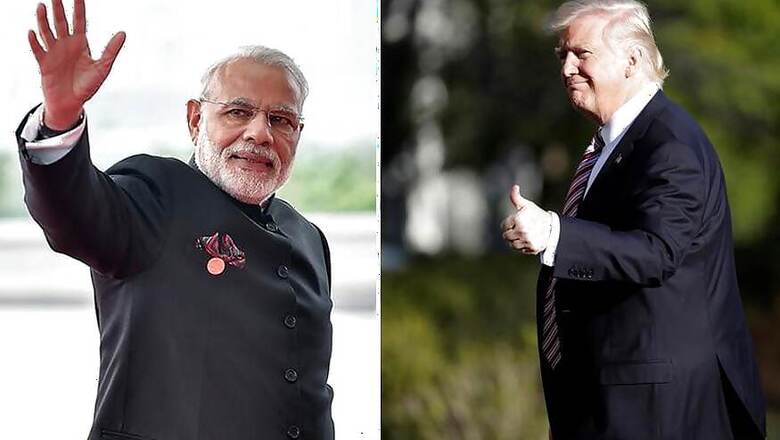
views
New Delhi: India is pushing for US approval of its request to buy a naval variant of the Predator drone, officials said, as Prime Minister Narendra Modi tries to revitalise relations with Washington when he meets President Donald Trump for the first time.
Securing agreement on the purchase of 22 unarmed drones is seen in New Delhi as a key test of defence ties that flourished under former President Barack Obama but have drifted under Trump, who has courted Asian rival China as he seeks Beijing's help to contain North Korea's nuclear programme.
Modi's two-day visit to Washington begins on Sunday. Trump met Chinese President Xi Jinping in April and has also had face-time with the leaders of nations including Japan, Britain and Vietnam since taking office in January, prompting anxiety in New Delhi that India is no longer a priority in Washington.
If the Indian navy gets the unarmed surveillance drones it wants to keep watch over the Indian Ocean it would be the first such purchase by a country that is not a member of the NATO alliance.
"We are trying to move it to the top of the agenda as a deliverable, this is something that can happen before all the other items," said one official tracking the progress of the drone discussions in the run-up to the visit.
India, a big buyer of U.S. arms recently named by Washington as a major defence ally, wants to protect its 7,500 km (4,700 mile) coastline as Beijing expands its maritime trade routes and Chinese submarines increasingly lurk in regional waters.
But sources tracking the discussions say the US State Department has been concerned about the potential destabilising impact of introducing high-tech drones into South Asia, where tensions are simmering between India and Pakistan, particularly over Kashmir, which is divided between them.
Other strains have emerged, with the United States vexed by a growing bilateral trade deficit and Trump accusing New Delhi of negotiating unscrupulously at the Paris climate talks to walk away with billions in aid.
US officials expect a relatively low-key visit by Modi, without the fanfare of some of his previous trips to the United States, and one geared to giving the Indian leader the chance to get to know Trump personally and to show that he is doing so.
Modi is also not expected to press hard on a U.S. visa programme the Trump administration is reviewing to reduce the flow of skilled foreign workers and save jobs for Americans, seeing limited gains from raising a sensitive issue, they said.
Indian Trade Secretary Ria Teaotia told reporters this week the H-1B visa programme, under which Indian IT firms send large numbers of professionals to the United States, would be one of the one issues on the table during Modi's visit.
FALLING OFF THE RADAR
"There is a palpable fear in New Delhi that the new U.S. president's lack of focus on India, and limited appointment of South Asia focused advisors, has resulted in India falling off the radar in Washington," Eurasia Group's Shailesh Kumar and Sasha Riser-Kositsky said in a note.
Defence deals, however, are one area where the two countries could make progress because of bipartisan support, an Indian official involved in the preparations for the visit said.
The two sides have stepped up efforts in recent weeks to get inter-agency clearance for the sale of the Guardian drone, made by California-based General Atomics.
India has raised the issue of the drones with the Pentagon three times since June 2016, officials said.
US Senators John Cornyn and Mark Warner wrote in March to Defense Secretary James Mattis and Secretary of State Rex Tillerson saying the Guardian deal, estimated at more than $2 billion, would advance U.S. national security interests and protect U.S. jobs.
An industry official involved in promoting India-U.S. business ties said the drone sale enjoyed support from the White House and Congress, and was now awaiting clearance from the State Department.
While the Guardian drones that India is pushing for are unarmed, the Indian military had originally asked for missile-firing Predator Avenger aircraft, a request turned down by the Obama administration.
Sources say there is some concern in the State Department that if India were to get the surveillance drones New Delhi would renew its push to acquire armed drones, which its military has eyed ever since they were deployed by U.S. forces against militants in Pakistan.
U.S. export laws typically prohibit the transfer of such arms to a country unless it is fighting alongside U.S. forces.
FIGHTER JETS
India and the United States will also discuss the sale of U.S. fighter jets during Modi's trip, in what could be the biggest deal since they began deepening defence ties more than a decade ago.
On Monday, Lockheed Martin announced an agreement with India's Tata Advanced Systems to produce F-16 planes in India, provided it won a contract to equip the Indian Air Force with hundreds of new aircraft.
Lockheed has offered to shift its ageing F-16 production line from Fort Worth, Texas as part of Modi's "Make-in-India" drive while it ramps up production of the high-end F-35 aircraft at home.
Since Trump's election on an "American First" platform, U.S. and Indian officials have sought to play down any contradiction between his stated desire to protect American jobs and Modi's "Make in India" policy, arguing, for example, that deals in which components made in the United States are shipped to India for assembly benefit workers in both countries.


















Comments
0 comment